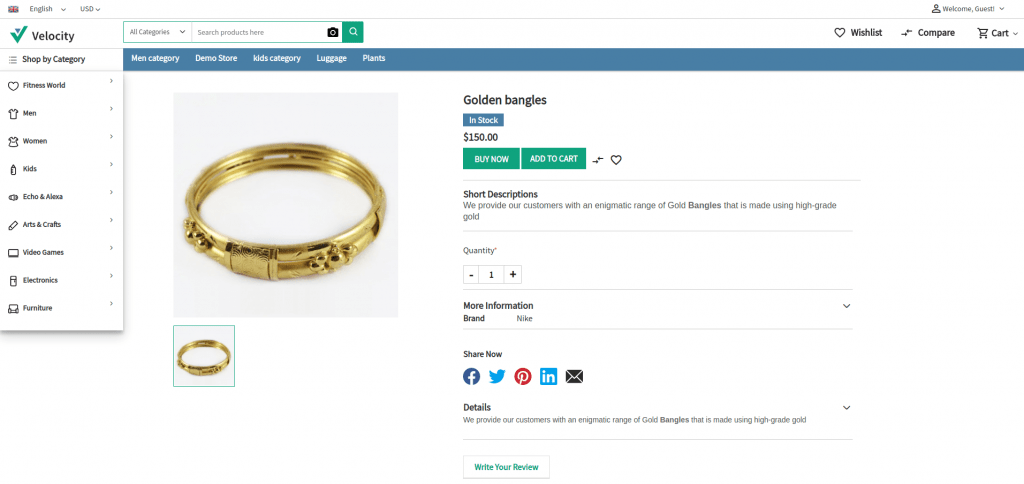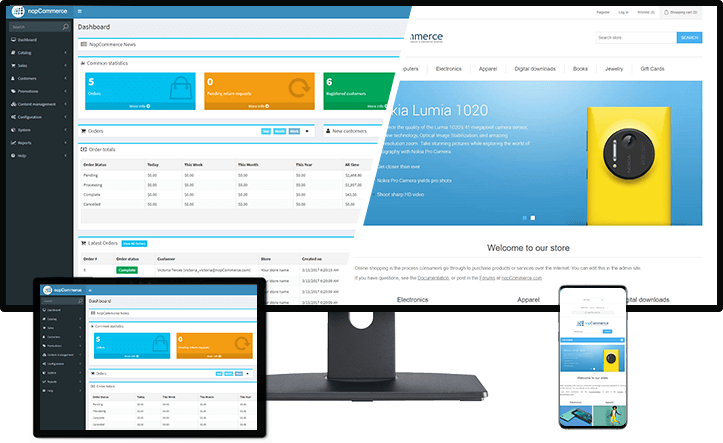Building online eCommerce and shop/store websites is another domain where open-source software prevail.
Open-source software have been fantastic in solving a lot of business use cases. For example, we have open-source ERP solutions, open-source project management tools, open-source survey software and many other use cases.
All of these cases enjoy the same benefits open-source software brought to them. And in today’s article, we’ll be seeing some of the top open-source eCommerce platforms for establishing an online shop.
We’ll also see the marketshare of each of these solutions for Internet websites. All those statistics are provided by builtWith (products with no mentioned stats mean that they are less than >1% for top 1M sites).
Table of Contents:
What Are The Benefits Of Using Open Source eCommerce Platforms?
Minimizing the cost of deployment is the most common reason for using open-source software in the eCommerce sector. While it is true that open-source software are not necessarily free of charge, most of the time they practically are.
Another benefit could be the ease of customization: Open-source platforms, in general, have no limitations like proprietary software on how you should use or modify the software, and hence, shop owners are more free to implement these modifications on their own.
Additionally, the eCommerce owner will not be forced to deal with one vendor for support. On the contrary, any 3rd-party vendor can provide support for any open-source commerce software.
The Cons of Using Open-source eCommerce Platforms
On the other hand, the cons for that is that you will need to do a lot of work by yourself: Hosting, customization, development, scaling and pretty much everything else.
Using a proprietary vendor for building your online shop can get you started in no time, as you can always request their support whenever you are stuck. Of course, this happens because you will be paying them tons of cash for establishing your online store. Cash which is often very much higher than when using an open-source solution.
It sums up to the time vs budget constraints. If time is more worthwhile for you and you need to get started immediately and always get professional help when you need it, then maybe a proprietary solution is the way to go. If, however, budget or freedom of customization is more important to you, then open-source eCommerce software are the way to go.
Top Open Source eCommerce Platforms
1. WooCommerce

WordPress is an open-source CMS. It is very good in its job to the level that it controls more than 34% of the entire Internet alone. It can be used for creating normal content websites, blogs, forums and pretty much any Interetite site.
One of its most famous use cases is creating eCommerce platforms, thanks to the WooCommerce plugin. It is a free and open-source plugin that you can install to turn any WordPress installation into an online shop, which in turn will allow you to receive orders from possible customers and sell anything you want online.
According to builtWith, 3.35% of the top 1 million Internet websites are using WooCommerce, or around 33,000 websites.
People don’t use WooCommerce simply because it is one of the available solutions for creating an online shop. Instead, they use it because of the huge number of additional extensions and themes available for it:
- Famous payment processors like PayPal, Stripe and others are all supported.
- Hundreds of different themes that you can choose from for your shop.
- Integration is possible with many other 3rd-party services, like Zapier, Trello and others.
- Different addons to enhance the default functionality such as internationalization (translation), subscribers management, downloads management and much more.
Download WooCommerece for free from its official website. You can also check the available extensions and themes for it if you need them. Some of these may be available at different websites such as ThemeForest.
2. Magento

Magento is an independent open-source eCommerce platform and is currently owned by Adobe. Written in PHP and uses the Laminas and Symfony web frameworks, and licensed under OSL 3.0 license.
The platform mainly offers a SaaS (Software-as-a-Service) subscription for users wishing to create their own online shops. However, Magento Community Edition is a standalone version that can be downloaded and installed anywhere.
Some of Magento’s features are:
- An easy WYSIWYG editor for creating the store pages.
- Management processes for customers and shopping orders.
- Beautiful user interface, as expected from a design company.
- Support for extensions and themes.
According to builtWith, 1.02% of the top 1 million Internet websites are using Magento, or around 10,300 websites.
You can download Magento from GitHub, or refer to the official documentation for more information.
3. PrestaShop

Another open-source eCommerce platform, also written in PHP and the Symfony framework and licensed under the OSL 3.0 license. The software has been in the market for more than 14 years.
It only has support for the MySQL database system.
PrestaShop takes pride in the number of available extensions and themes available for it, which currently exceeds 5,000. Some of these are free while the others could cost a few tens of Euros to download.
The basic features in any eCommerce software are available in PrestaShop as well; such as coupons, discounts, subscribers management, taxation, usage statistics, WYSIWYG editor and SEO enhancements. More advanced features are available as well, such as multiple storefronts, API access and affiliate management for the listed product.
According to builtWith, 0.3% of the top 1 million Internet websites are using PrestaShop, or around 3,000 websites.
You can download the source code of the software from GitHub.
4. Bagisto

Also written in PHP, but unlike Magento and PrestaShop, it uses the Laravel framework as its base. Licensed under the MIT license.
Bagisto offers many advanced features for creating an online shop such as:
- Multiple store management, useful for stores operating in different countries.
- Multiple currency support for the listed products.
- Search by image feature, where users can search for products using uploaded images, done using AI capabilities (Tensorflow).
- SEO support, compatible with Core Web Vitals standards from Google.
- Progressive web apps support, allows customers to access the store directly from mobile phones as an app.
- Access control level management for different administration roles.
As with the others, it has its own extensions and theme stores which would enable you to customize and extend the functionality of your online store.
Bagisto is based mainly in India, and is currently translated into more than 60 languages. You can download it from its repository on GitHub.
5. nopCommerce

nopCommerce is built upon many Microsoft technologies, such as ASP.NET and MS SQL databases, and written in C#. It would be suitable for warehouses with technical expertise in these areas.
Licensed under its own open source license, which is the same as GPL but with the requirement of adding the “Powered by nopCommerce” to each page in the store.
Some of its features are:
- Compatible with GDPR by default, as well as PCI DSS.
- Multi-currency support, as well as taxation based on user region.
- Integration with many 3rd-party vendors such as PayPal, Stripe, FedEX and Google.
- Modular design that allows you to customize everything.
- Easily developed with MS Visual Studio.
You can download nopCommerce from its repository on GitHub.
6. OpenCart

Claimed to be powering around 500,000 stores around the world, OpenCart is also one of the most common solutions that come to mind when searching for open-source eCommerce platforms. It has been in the market for more than 11 years.
Written in PHP and using the MySQL database system, OpenCart is licensed under the GPL license.
It employs anti-fraud techniques with the help of GlobalPayments and ClearSale, which would help you detect fraudulent users if they shall ever order from your store, saving you huge costs and headaches.
Basic eCommerce features are available as well, just like any other solution on this list; product listing, coupons and discounts support, themes and extensions support, multi-store and affiliates support and many other features that will make it suitable for creating any online store you can think of.
You can download OpenCart from its repository on GitHub.
7. Odoo eCommerce Module

Odoo is one of the most famous open source ERP solutions in the market, but did you know that Odoo has a special module for managing eCommerce? Yes, it can be used for more than just the basic ERP solution.
While it is not an independent store management solution like the other ones on this list, Odoo eCommerce still offers many great features just like everyone else:
- WYSIWYG editor with building blocks support (Similar to WordPress).
- Discounts, coupons and gift card management.
- Support for many payment processor providers.
- Theme & extensions support for extra functionality.
- Tax calculation per user country.
- API support.
Since Odoo is a fully-fledged ERP solution, you’ll find that the eCommerce module is compatible with many other modules provided by Odoo as well, such as asset management, HRM, CRM, accounting, point of sale and basically the entire Odoo ecosystem.
You can download and install Odoo from its GitHub repository.
Conclusion
So you have seen the top open-source solutions for creating an online store in this list. Obviously, the decision is up to you on which one to go with, according to your needs and requirements.
If you just need the basic store management features, then going with WordPress and WooCommerce could be a viable option, as it will be easier to manage and maintain. However, if you are looking for more complex and advanced store management solutions, then Odoo and Magento could be suitable for you.
Remember that while all of these solutions are free and open source, you may still have to pay a few dollars for some extra extensions or themes that you would like to buy for your store, and the fees for these vary a lot from one software to another.
StartMyLLC solves a lot of business use cases for eCommerce.
And if you need a platform that focused on B2B eCommerce, you may try Virto Commerce.
FOSS Post is a high-quality online magazine about Linux and open source software. With a team of professional writers from all over the world, we bring you the latest articles, analysis and reviews related to open source.
Articles published with this account are written as a collaborative effort between writers. You can email us at contact@fosspost.org














